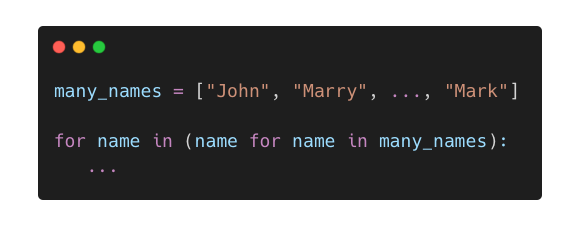Python Generators: When to Use?
Python generators is a really powerful tool that can help you optimize your code.
But sometimes its impact is more useless than useful. Let’s have a look at some examples to figure in which cases it is better to use them…
You have any sequence you’d like go through
Here don’t try to convert your list to the generator with comprehensions. There you already havemany_names in your memory, so then if you create an additional variable you only spend an additional place for it

You have to go through a filtered sequence
Let’s imagine that you also have a many_names list that has duplicates inside. So you want to exclude duplicated but save the ordering of your source list.

Files opening
Of course, you can read your files with the function below. Actually, it will work but try to do the same with the file of 100.000 lines. I hope you have so much RAM 🙂.

Using generators 👇

Generating random uniq values

You need to check a batch of ordered urls with the same placeholder
Lets say, you have a website my-blog.com/posts.
All posts urls match the pattern my-blog.com/posts/{N}, where N — the number of the specific post
You need to go through first 10.000 posts

If you create a list with URLs you have a pretty big object in memory. In the case of using the generator, you don’t remember the context of the previous URL creation so you create only one URL on each iteration. It means you are not limited with your memory.
Using generators as a Coroutine. Advanced
Let’s take a look at a little bit more advanced generator usage. Instead of returning values we also could send values to generators. More common usage it’s async/await but anyway let’s take a look at the example of a function that calculates the average for numbers you send to it.

👉🏻 Actually, you can make it a little bit easier with a custom coroutine decorator in order to not to call next() every time for initialization

In Plain English
Thank you for being a part of our community! Before you go:
- Be sure to clap and follow the writer! 👏
- You can find even more content at PlainEnglish.io 🚀
- Sign up for our free weekly newsletter. 🗞️
- Follow us on Twitter(X), LinkedIn, YouTube, and Discord.

